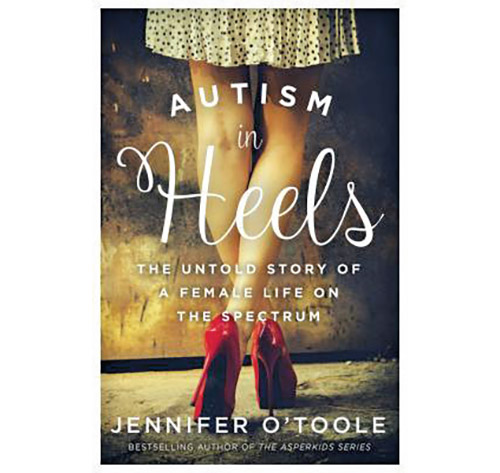
Reviewing: “Autism in Heels” by Jennifer Cook O’Toole. 2018. Skyhorse Publishers. Hardcover. 272 pages. English. ISBN-13: 978-1510732841
“Autism in Heels,” is about autism spectrum disorder (ASD) and is written by Jennifer Cook O’Toole. Jennifer is a brilliant woman with ASD, though she doesn’t like the term “disorder” and would much prefer it being replaced with autism spectrum dynamic. ASD has a strong genetic basis. Her father had the disorder as do two of her children. The term “aspie” is an affectionate one for people with Asperger’s syndrome suggested by the author, self advocate and now personal friend of Cook O’Toole, Dr. Lianne Holliday Wiley.
After Dr. Cook O’Toole’s father and two of her eldest children were diagnosed with ASD, each later in years, she reluctantly confided this information to her therapist, who asked her “Jennifer, does it matter to you, the diagnosis?” Yes, she answered “because they are living in a mean and strange world. I’m a total failure at being human.” The therapist assured her that she was not a failure and concurred with her diagnosis of herself that she too has Asperger’s. When she diligently looked into the details of ASD, she realized that the therapist was correct and that despite the fact that psychiatrists said (and most still do) that many more males than females have the disorder this is in actual fact not true. Obviously in her case, her symptoms were in female form—very different from males.
Dr. Cook O’Toole’s IQ is at the very top of the genius level. It is higher than 99.9 percent of all people! So how does the problem manifest itself? The problem is that her ability to read emotions of people right in front of her is poorer than 70 percent of other people. As a result she is almost always feeling embarrassed, judged and judging herself. When she interacts with people, they incorrectly intuit, as do the overwhelming majority of people, what she means, when in fact it is absolutely not true and so she goes through life being misunderstood, not understanding what the problem is and therefore deeply embarrassed. The most important thing to understand is that words are powerful. She has heard many partners and professionals complain that “an individual is academically really brilliant, but socially very immature and awfully particular about everything.” And just as she doesn’t understand what they are talking about, they don’t understand what she is talking about.
She has become a well-known speaker and is the winner of the Temple Grandin award for global contributions. She has advised the President’s National Council on Disabilities and sits on the professional panel of the Autism Society of America. When she goes to speak she sometimes suggests that her children accompany her to the ladies room after the session. And the truth for her of the ladies room is that ladies need room to find each other. For many in the audience, whenever she speaks, many of them follow her to the bathroom, knock on the stall door and ask if they can ask a quick question. In the middle of noisy flushes and hand driers, they share with her the most vulnerable and existential moments of their lives, saying something like “Now I realize, I think I’m on the spectrum too.”
The chapter on the problems she frequently has with men is an eye opener along with everything else in this amazing book. Shocking revelations are disclosed. I would be happy to discuss this worthwhile publication with anyone who wishes. I can be reached at 201-385-4373.
By Rabbi Mordechai Glick










